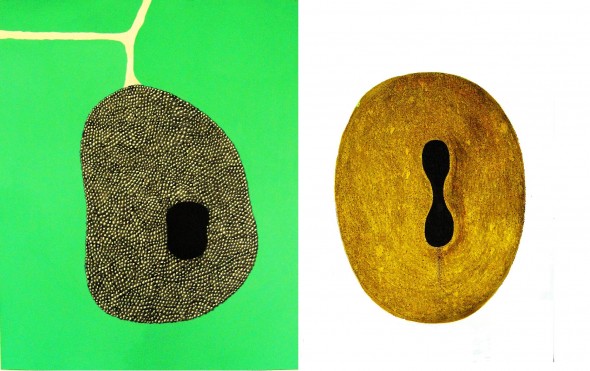Search results for "lola rogers/www.booksfromfinland.fi/2012/04/movies-and-mores/2010/02/let-us-eat-cake"
The honey of the bee
30 June 2005 | Archives online, Fiction, Prose
A short story from the collection Mitä sähkö on (‘What electricity is’ WSOY, 2004). Introduction by Jarmo Papinniemi
Five days before I was born my grandfather reached sixty-six. He’d always been old. The first image I have of him gleams like a knife on sunny spring-time snow: he was pulling me on my sledge over hard frost under a bright glaring-blue sky. In the Winter War a squadron of bombers had flown through the same blue sky on their way to Vaasa; the boys leapt into the ditches for cover, as if the enemy planes could be bothered to waste their bombs on a couple of kids. Be bothered? Wrong: kids were always the most important targets.
Now it’s summer, August, and I’m sitting on the grassy, mossy face of the earth, which is slowly warming in a sun that’s accumulated a leaden shadiness. I’m sitting on my grandfather’s land. It’s the time when the drying machines buzz. Even with eyes shut, you can sense the corn dust glittering in the sun. Even with eyes shut, you can take in the smell of the barn’s old wood, the sticky fragrance of the blackcurrants barrelled on its floor, the tins of coffee and the china dishes on the shelves, and the empty grain bins; there’s the cupboard Kalle made, with its board sides and veneered door, and the dust-covered trunk that was going to accompany my grandfather to another continent. The ticket was already hooked, but Grandfather’s world remained here for good. When Easter comes we’ll gather the useless junk out into the yard and burn it; Grandfather’s travel chest will rise skywards. Grandfather stands in the barn entrance, leaning on the doorpost. He’s dead. Over all lies a heavy overbearing sun. Beyond the field the river’s flowing silently in its deep channel. At night time its dark and warm. More…
A good day
30 June 2001 | Archives online, Fiction, poetry
From Juomarin päiväkirjat (’A drunkard’s journals’, edited by Pekka Tarkka, Otava, 1999). Introduction by Claes Andersson
Iceland, Summer 1968
I don’t know how to describe what I see,
the lava’s colors; the afternoon green of the grass,
and I can’t tell if that white is buildings or snow.
The mountains are fortresses of the gods, and if
people’s construction projects irritate them
too much, they let the ground shake, volcanos
erupt and tum everything upside down, assign new sites
to houses and different routes for cars.
The gods’ noses itch when their breath
is caught in pipelines and
channeled into radiators and greenhouses.
Sheep tear the grass but horses
browse in a civilized manner.
Jónas does not believe in the gods, but he
is afraid of them, the gods are not pleased
with the Americans, who do not know
anything about the gods or history yet come here
and start interfering with the land
as if it were theirs.
*** More…
Do you speak my language?
23 August 2012 | Articles, Non-fiction
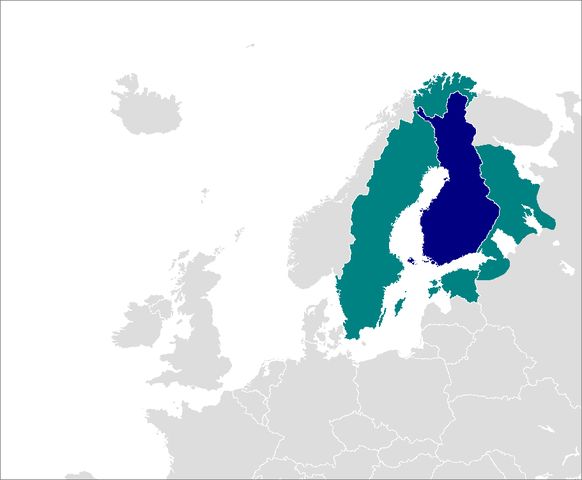
Finnish spoken outside Finland: Sweden (west), Estonia (south), Karelia/Russia (east), Norway (north). Illustration: Zakuragi/Wikipedia
Finland has two official languages, Finnish and Swedish. Approximately five per cent of the population (290,000 Finns) speak Swedish as their native language. All Finns learn both languages at school, and students in higher education must prove they have an adequate knowledge of the other mother tongue. But how do native speakers of Finnish cope with what is, for many of them, a minority language that they will never need or even wish to use? We take a look at bilingual issues – and a new book devoted to them
‘In many parts of the world, language can be a fiery and divisive issue, one that pits the powerless against the powerful, the small against the big. The Basques battle the Spanish. The Flemish tussle with the Walloons. The Québécois scuffle with the rest of Canada.’
That is how Lizette Alvarez illustrated her theme in her article ‘Finland Makes Its Swedes Feel at Home’, published in the New York Times in 2005.
In Finland, language has been a fiery issue at times, though things have cooled down a bit since the early 20th century. The use of Finnish as a written language dates back to the 16th century, but the territory of Finland was part of the Swedish Empire until 1809. Swedish was spoken by the nobility as well as most of the peasant class – the mechanism of the state did not serve Finnish-speaking peasants or other segments of the population in Finnish. More…
Markus Majaluoma: Hulda kulta, luetaan iltasatu! [Hulda dear, let’s read a bedtime story!]
27 January 2011 | Mini reviews, Reviews
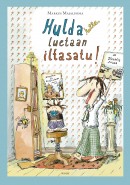 Hulda kulta, luetaan iltasatu!
Hulda kulta, luetaan iltasatu!
[Hulda dear, let’s read a bedtime story!]
Helsinki: WSOY, 2010. 24 p., ill.
ISBN 978-951-0-36284-6
€ 23.20, hardback
Since 1996, illustrator Markus Majaluoma (born 1961) has written and illustrated 17 children’s books. His picture books have been translated into six languages. In this, the third book of its series, Jalmari reads a bedtime story chosen by his strong-willed baby daughter Hulda – one that they’ve read a hundred times before, children being famously conservative in this regard. In the story, a wasp stings a bear. Jalmari falls asleep, but as clever little Hulda knows how the story ends, there will be a surprise for the snoring dad. The stripped-down little narrative is fleshed out with plenty of details in Majaluoma’s highly original illustrations (the wasp playfully stings with its snout) often standing in humorous counterpoint to the text, an amusing bonus for the adult reading it as a bedtime story.
Translated by Ruth Urbom
Markku Koski: ‘Hohto on mennyt herrana olemisesta’ [‘The glory has gone from being a VIP’]
7 May 2010 | Mini reviews, Reviews
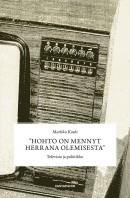 ‘Hohto on mennyt herrana olemisesta’ – Televisio ja poliitikko
‘Hohto on mennyt herrana olemisesta’ – Televisio ja poliitikko
[‘The glory has gone from being a VIP’ – the television and the politician]
Tampere: Vastapaino, 2010. 254 p.
ISBN 978-951-768-249-7
€ 29, paperback
This book, based on the author’s doctoral thesis in Media and Communication Studies at the University of Tampere, presented in February 2010, takes as its starting point Walter Benjamin’s well-known essay, ‘The Work of Art in the Age of Mechanical Reproduction’. Koski applies Benjamin’s ideas on cinema and film stars to contemporary television and politics. Koski maintains that while the public have become alienated from politics, politicians have also become alienated from themselves and have become reiterative entities whose essential content is repetition. After television and other new media have called into question traditional forms of politics, a significant challenge for politicians has been to prevent viewers from getting bored. Koski discusses relationship between politics and comedy, the ‘cynical’ viewer, the popular public image of Marshal Mannerheim (an iconic figure in Finnish history and politics) and the popularity of Sauli Niinistö, the frontrunner in the upcoming (2012) Finnish presidential election. Dr Koski also considers historical and contemporary image politicians in various other countries.
No place to go
30 March 2008 | Archives online, Fiction, Prose
Extracts from the novel Lakanasiivet (‘Linen wings’, Otava, 2007)
The clothesline swayed in the wind. Helvi closed her eyes and felt herself flutter into the air with the laundry. She flapped her white linen wings, straining higher, now seeing below the whole small peninsula city, its damp rooftops glittering in the morning sun, the blue sighs of the chimneys, the steamboats toiling on the lake and the trains chugging on their tracks. The whole of heaven was clear and blue; only far off in the east were there white pillars roiling – whether smoke or clouds, Helvi could not tell.
She flew north on her linen wings and saw the great bridges leading to the city, on whose flanks the hidden anti-aircraft batteries gasped the fumes of gun oil and iron, and continued her journey over the land, following the straight lines of the telephone wires. She flew over wooded hills and deep green fields, finally arriving on the slope of the great hill where her daughter now lived, in hiding from the war. More…
Teemu Kupiainen & Stefan Bremer
Music on the go
3 March 2010 | Extracts, Non-fiction
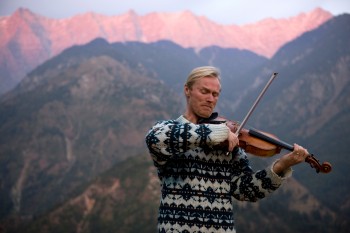
A little night music: Teemu Kupiainen playing in Baddi, India, as the sun sets. Photo: Stefan Bremer (2009)
It was viola player Teemu Kupiainen‘s desire to play Bach on the streets that took him to Dharamsala, Paris, Chengdu, Tetouan and Lourdes. Bach makes him feel he is in the right place at the right time – and playing Bach can be appreciated equally by educated westerners, goatherds, monkeys and street children, he claims. In these extracts from his book Viulun-soittaja kadulla (‘Fiddler on the route’, Teos, 2010; photographs by Stefan Bremer) he describes his trip to northern India in 2004.
In 2002 I was awarded a state artist’s grant lasting two years. My plan was to perform Bach’s music on the streets in a variety of different cultural settings. My grant awoke amusement in musical circles around the world: ‘So, you really do have the Ministry of Silly Walks in Finland?’ a lot of people asked me, in reference to Monty Python. More…
In with the new?
17 December 2010 | Letter from the Editors
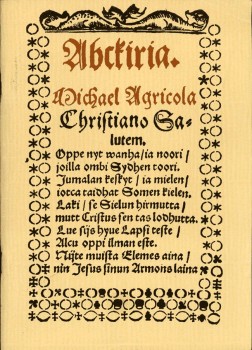
Abckiria (‘ABC book’, 1543): the first Finnish book, a primer by the Reformation bishop Mikael Agricola, pioneer of Finnish language and literature
In August 2010 the American Newsweek magazine declared Finland (out of a hundred countries) the best place to live, taking into account education, health, quality of life, economic dynamism and political environment.
Wow.
In the OECD’s exams in science and reading, known as PISA tests, Finnish schoolchildren scored high in 2006 – and as early as 2000 they had been best at reading, and second at maths in 2003.
Wow.
We Finns had hardly recovered from these highly gratifying pieces of intelligence when, this December, we got the news that in 2009 Finnish kids were just third best in reading and sixth in maths (although 65 countries took part in the study now, whereas in 2000 it had been just 32; the overall winner in 2009 was Shanghai, which was taking part for the first time.)
And what’s perhaps worse, since 2006 the number of weak readers had grown, and the number of excellent ones gone down. More…
Below and above the surface
13 March 2014 | Extracts, Non-fiction
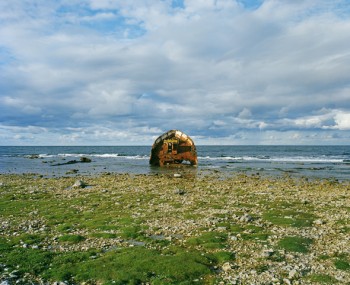
Fårö, Gotland, Sweden. Photo: Lauri Rotko
The Baltic Sea, surrounded by nine countries, is small, shallow – and polluted. The condition of the sea should concern every citizen on its shores. The photographers Jukka Rapo and Lauri Rotko set out in 2010 to record their views of the sea, resulting in the book See the Baltic Sea / Katso Itämerta (Musta Taide / Aalto ARTS Books, 2013). What is endangered can and must be protected, is their message; the photos have innumerable stories to tell
We packed our van for the first photo shooting trip in early May, 2010. The plan was to make a photography book about the Baltic Sea. We wanted to present the Baltic Sea free of old clichés.
No unspoiled scenic landscapes, cute marine animals, or praise for the bracing archipelago. We were looking for compelling pictures of a sea fallen ill from the actions of man. We were looking for honesty. More…
In one hundred springtimes
23 November 2012 | Extracts, Non-fiction
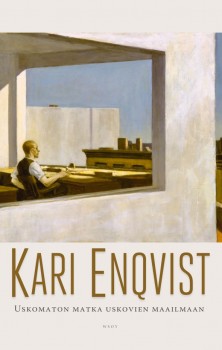 Extracts from Uskomaton matka uskovien maailmaan (‘An unbelievable journey into the world of the believers’, WSOY, 2012)
Extracts from Uskomaton matka uskovien maailmaan (‘An unbelievable journey into the world of the believers’, WSOY, 2012)
In his new book the writer, professor of cosmology, a scientist without a religion Kari Enqvist explores religiosity, how it manifests itself in present-day Finland, in various churches and parishes. How will the expanding scope of science and secularisation change the world and the forms of spirituality in the course of the next century?
When, in July 1969, Neil Armstrong climbed down the ladder on to the surface of the Moon, it was a huge propaganda coup for both the United States and the scientific world view. Manned space flights as a way of gaining knowledge are both ineffective and brain-numbingly expensive, but it is hard to imagine a stronger individual and universally understandable demonstration of the superiority of the scientific world view than an astronaut on the surface of a foreign celestial body. Everyone can recognise it as a triumph of both engineering technology and the hard sciences.
But the astronaut solution has been tested already, and I do not believe that space travel will expand our consciousnesses in the next century. It is possible that we will not even have visited Mars. Fantasies about manned flights to other stars are, in my opinion, utopian in the extreme and I do not really believe that humans as physical beings will ever leave the solar system. Journeys to the stars are inconceivably long and so expensive that they cannot be embarked on merely in order to fulfil the Buck Rogers fantasies of teenage boys. Carrying humans to the closest one, alpha Centauri, a mere four light years away, would take, at best, hundreds of years (we can dismiss rockets that travel at the speed of light as mere scientific fantasy). Even if deep-freezing to slow vital functions were possible, it would make as much sense to pay hundreds of billions to freight pig carcasses to the planets. For everything that human beings can do can be done better – and, more importantly, more cheaply – by machines. Even if the spirit were willing, the flesh is so weak that silicone beats it hollow.
So it is my guess that in place of the macrocosmos the scientific world view will seek consolidation in the microcosmos. As a cosmologist, I am not happy to admit this, but admit it I must. More…
A day in the life
30 September 1996 | Archives online, Fiction, Prose
Extracts from the novel Drakarna över Helsingfors (‘Kites over Helsingfors’, Söderströms, 1996). Introduction by Jyrki Kiiskinen
It is December 1970, it is Friday afternoon and Helsingfors is shrouded in a damp, leaden-grey fog when Jacke Pettersson, trainee electrician at Mid-Nyland Vocational College, signs a receipt for his driving licence at Vallgård Police Station.
At home in the flat in Svenska Gården in Munkshöjden: the very next evening Jacke sneaks his hand down into his father’s, typesetter K-G. Pettersson’s, overcoat pocket. It is getting on for 9 o’clock and KG is sitting deeply submerged in his favourite armchair, staring concentratedly at the premiere of a new show.
Six out of forty
make it every week
sings a bright girl’s voice.
Then: the Official Supervisors and their solemn ‘Good evening’. And then: the blonde girl in her mini-dress and high boots, the glass holder with its plastic balls, the plastic balls with numbers on. More…
And he left the road
30 June 1983 | Archives online, Fiction, Prose
Three short stories from Maantieltä hän lähti (‘And he left the road’). Introduction by Eila Pennanen
And he left the road
And he left the road, walking straight ahead across fields and ditches, past barns and through bushes growing in the ditch. From the fields he went on to the forest, climbed a fence, walked past spruce and pine, juniper bushes and rocks, and came to the edge of a forest and to the swamp. He crossed the swamp, going through small groves of trees if they happened to be in his way. He went on walking rapidly across rivers, through forests, over seas and lakes, and through villages, and finally he came back to the very spot from which he had started walking straight ahead.
In the same way he walked at a right angle to the direction he had first taken and after that, a few times between those two directions. Every time he would start from the road and in the end would always come back to the road in the same direction as when he’d started off. On his rounds, after walking a bit, he would stop and look up every now and then, and each time he looked he would see the sky and sun or the moon and stars. More…
Green thoughts
Extracts from the novel Kuperat ja koverat (‘Convex and concave’, Otava, 2010)
I decided to go to the Museum of Fine Arts.
After paying for my entrance ticket, I climbed the wide staircase to the first floor. There all I saw were dull paintings, the same heroic seed-sowers and floor-sanders as everywhere else. Why were so many art museums nothing more than collections of frames? Always national heroes making their horses dance, mud-coloured grumblers and overblown historical scenes. There was not a single museum in which a grandfather would not be sitting on a wobbly stool peering over his broken spectacles, interrogating a young man about to set off on his travels, cheeks burning with enthusiasm, behind them the entire village, complete with ear trumpets and balls of wool. The painting’s eternal title would be ‘Interrogation’ and it would be covered with shiny varnish, so that in the end all you would be able to see would be your own face.
I climbed up to the next floor. All I really felt was a pressing need to run away. No Flemish conversation piece acquired in the Habsburg era was able to erase a growing anxiety related to love. More…
Love is the only song
7 August 2014 | Fiction, poetry
Poems from Helise, taivas! Valitut runot (‘Ring out, sky! Selected poems’, Siltala, 2014). Introduction by Marja-Leena Mikkola
Who will tell me?
Who will tell me why white butterflies
strew the velvet skin of the night?
Who will tell me?
While people walk, mute and strange
and they have snowy, armoured faces,
such snowy faces!
and the eyes of a stuffed bird.
Who will tell me why in the morning, on the grass,
the thrushes begin their secret game?
Who will tell me?
While black soldiers stand at the gate
in their hands withered roses
such withered roses!
and broken tiger lilies.
Who will tell me, quietly in the sun’s shadow
how to bare my heart?
Who will tell me?
Come to me over the fields
Come close and softly
so softly!
Open the clothes of my heart. More…
Poems
31 December 1985 | Archives online, Fiction, poetry
Introduction by George C. Schoolfield
Birds of passage
Ye fleet little guests of a foreign domain,
When seek ye the land of your fathers again?
When hid in your valley
The windflowers waken,
And water flows freely
The alders to quicken,
Then soaring and tossing
They wing their way through;
None shows them the crossing
Through measureless blue,
Yet find it they do.
Unerring they find it: the Northland renewed,
Where springtime awaits them with shelter and food,
Where freshet-melt quenches
The thirst of their flying,
And pines’ rocking branches
Of pleasures are sighing,
Where dreaming is fitting
While night is like day,
And love means forgetting
At song and at play
That long was the way. More…

